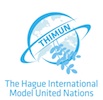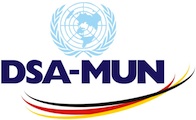All Committees day 2
Action Paper 1
Cities of today-Cities of tomorrow
The participants were divided to five teams:
The Infrastructure team, the Social Problems team, the Urbanisation team and two teams for enviromental issues, so that the conference could be more constructive. Today the mainly issues were about enviroment. As the chair said, the delegates were very active and knew a lot about the topics.
By Marita Boulougouri
Action Paper 2
Obesity and Malnutrition
In this Action Paper the participants made a conference about many topics.
The first topic was the malnutrition in developing countries. The delegates found many solutions. The developed countries and NGOs should help them by supplying them with nutritious food. The developing countries could use their resources either by using them for themselves or by selling them to make money, the people there should be taught how to take advantage of their agricultural productivity and help out each other in order to militate malnutrition.
The second topic was obesity. The participants found fewer solutions, but they were also good. The overweight people should exercise every day, limit the amount of sugar and become informed of the condition by family or school.
The third topic was the malnutrition in developed countries. The solution here was that the government should make advertisements, seminars and campaigns against this condition.
By Marita Boulougouri
Disarmament and International Security
From the first moment there, I realised the atmosphere in the committee room was admirable. The three topics being discussed (the situation in Pakistan, Measures to uphold the authority of the 1925 Geneva protocol, Global Zero- a world without nuclear weapons) were of great importance. The delegates are trying to work productively they can and they all characterize themselves as very active, passionate and sensitive to the problems involved. In general, the delegates are trying to find a decision that can be adopted from all the countries.
It was the second day of the conference. By the time we walked into the meeting, the delegates were discussing a very interesting point, global zero- a world without nuclear weapons. In this topic there are two resolutions. All delegates were very competitive and, as the chair informed us, very enthusiastic. Malta mentioned that the problem had to be solved and also that her resolution offered measures for this problem. Then the floor was taken by the UN, saying that its resolution covers all the problems. UN urged the delegates to vote in favour of this resolution. A great speech was given by South Sudan, which voted in favour of this resolution, because it wanted to protect these people who are unable to do it for themselves. Spain had a different opinion. Spain said that this resolution does not propose any solutions. South Sudan strongly disagreed. Some tense moments occurred during the debate. The delegate of Hungary was active and tried to take the floor many times, but his offers were often denied. In conclusion, a problem of plagiarism occurred, but the chairs solved it very quickly and successfully.
ECONOMIC AND SOCIAL COUNCIL
We went into the meeting room and were present in the debate of the first resolution of the Economic and Social Council Committee. According to the chairs the delegates were very co-operative and active so they reached the score of eleven resolutions. 3 resolutions for the growing role of turkey and 2 for each other issue. It was the time to discuss about the rising food prices and their effect on LEDCs. It must be pointed out that the delegate of turkey have mentioned some very good points.
Eva Kapou
Peny galanou
Athina gaitanou
Enviromental and Cultural Committee
All of the delegates, even if they were newcomers at the most, meaning that it was their first MUN, were very active and cooperative. A lot of objections were made and amendments were submitted.
In the debate there was a number of seven resolutions in total, three for the topic ‘Towards the acceptance of indigenous people in the world’, but only one of the resolutions was completed. Due to the big number of amendments focused on the topic itself, other resolutions could not be completed.
The guest speaker, Mr. Spyros Kiarkis , gave a very appealing presentation on the potential future of Europe’s energy. He illustrated the goals Europe wants reach in the next 20 years and what steps need to be taken in order to reach a solution in the pursuit of extreme energy.
After long debating, lots of arguments, decisions, and votes, the debate came to a good resolution.
Marina Mattheou, Alexandros Tasoulas
INTERNATIONAL COURT OF JUSTICE
The I.C.J. started the second day with a discussion about the evidence they had its the case and voted if each piece is accepted or not. Then the advocates of Serbia and Croatia came into the meeting room and answered the judges` questions. After that some witnesses were called in order to testify for the case and answer to the questions of the judges and the advocates. The first witness was the ambassador of Russia, who cleared out some points. The second one was the ambassador of Serbia. Everything was running smoothly, until the witness, who was supposed to help the advocates of Serbia, agreed with the opposing side’s opinion that the operation storm of Croatia in Serbia was a humanitarian action. That meant that she was against of one of the most significant arguments of her country. This incident was something that upseted the one Serbian advocate, the following incident made him really indignant. The Serbian ambassador had eye contact with the judge, who at that point was asking her a question. Due to that the Croatian advocate objected as eye contact is not allowed. This were the Serbian advocate left the room. After this akward situation everybody needed a small break and the president had to remind all the participants to behave properly. The procedure continued normally with the examination of the next witness, the ambassador of Croatia. Then everybody went for lunch looking forward to the testimonies to come.
By Sofia Giannikou
Political Committee
Today was the second day of MUN. In the beginning of the conference, they did the lobbing about Sudan and South Sudan. They were separated in countries, which either supported Sudan or did not. The delegates also mentioned that Sudan and South Sudan had recently been separated. One half was supporting Moslem and the other half (mostly the black people) Christianity. The issues of the political committee were very interesting. There were around 7 resolutions. The main themes were: a) securing borders against migrants, b) the question of Sudan and South Sudan and finally c) Territorial disputes in the Arctic. Despite some difficulties that arose at the end we had a good cooperation with the chair. In addition, when the press team entered the room, the main issue under discussion was the one referring to the question of Sudan and South Sudan. The chair said that he was satisfied, because all of the countries participated, even if they were discussing region focus topics. Last but not least we asked the delegate of Sudan about the difficulties.
She applied by saying that there were always difficulties, especially when all the other countries (India, Australia, Cote d’ Ivoire, Cuba, Denmark, Ecuador, Egypt, Ghana, Greece, France, Finland, Israel, Italy, Japan, Lebanon, Malawi, Malta, Morocco, Nepal, Pakistan, Russian federation, south Sudan, Syrian Arab Republic, Tibet, Turkey, United Kingdom, Zambia) were against the country she was supporting(Sudan).
By Marina Mattheou
And Loukas Melissopoulos
Security Council
Today is the second day of the MUN conference and the Security Council is full of delegates who want to participate in debate of homeland security. Important matters are discussed like the situation on the Korean Peninsula. Many countries have spoken for and against like the delegation of US, China, France, Russia, Korea and DPRK (Democratic People’s of Republic Korea). There was a tense atmosphere visible between DPRK, Korea, Russia and the US. The delegation of Russia was against the US one and shared the same opinion with the DPRK which was contra to Korea. A solution has not been found yet, but all the delegations are working on it. More news about the Security Council will be published in the following newspaper’s web-edition.
By Loukas Melissopoulos
Social and Humanitarian Committee
From the very beginning, I could realise the atmosphere was vibrant and exciting. The delegates were trying to find a topic, on which a number of them could agree on. They were cooperative and they could understand each other very well. The three topics were the multifaceted image of women in modern society, “the elimination of all forms of intolerance and discrimination based on religion and last but not least is the missing children in industrialized nations”. The chairs, much in the same spirit with the delegates, were passionate, involved and ready to give useful instructions to all, so as to ensure that their work was of high caliber.
It was the second day of the conference. The Social and Humanitarian Committee produced 8 resolutions, three for ”Missing children in industrialised nations” and “ The multifaceted image of women in modern society” two for the issue “ The elimination of all forms of intolerance and discrimination based on religion or belief ”.The delegates were very active and productive. During our presence in the committee there was a discussion about education and having sex with 13 and it was very enjoyable to watch them. Japan was against this resolution because it was not considered as a realistic one. In general the chairs told us that they are very satisfied with the very active participation of the delegates.
Eva Kapou
Athina Gaitanou
Peny Galanou
Special Conference
By the time we walked into the meeting room as the press we faced a very productive committee. The topic of Wikileaks had 3 resolutions, Social Networks 2 resolutions, Protection of Media Personnel had 2, China had 3 and finally Concentration of Media Ownership had only 1 resolution. The chair admitted that all these issues were equally important and had to be effectively dealt with the help of the UN. The first topic was the protection of media personnel. The country, who first took the floor, was Portugal. This country urged the delegates to vote in favour for this resolution, because it really had realistic solutions for the protection of media personnel. They supported, that in case of violence journalists should definitely claim. Concerning the opinion of Portugal, armies have to help journalists in case of emergency. The delegate of Thailand had a question and, as he was very nervous, he tried many times to rephrase his question clearly and correctly. The chairs were very satisfied with the participation of the delegates. They described the delegates as active and the debate as an interesting one.
By Athina Gaitanou, Peny Galanou, Eva Kapou



